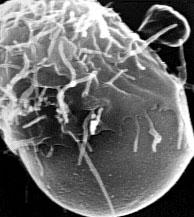Research
Research within the Center for Immunology focuses on several key aspects of immunity.
Autoimmunity and Tolerance

- How does the immune system acquire tolerance to self-proteins?
- How are self-reactive T and B lymphocytes eliminated during development?
- What are the biochemical mechanisms by which T cell tolerance is maintained in the peripheral immune system?
- Why does the immune system have so much difficulty recognizing tumor cells as foreign?
- How do the various cells in the immune system collaborate to maintain tolerance to self-proteins?
- What are the consequences of a breakdown in immunological tolerance?
- What is the molecular basis of autoimmune diseases?
Faculty researchers
Binstadt, Farrar, Fife, Freedman, Gregerson, Hogquist, Jenkins, Khoruts, Mueller, Schuldt, Spanier, Vezys
Immune response to infection

- How is the host immune response to pathogens regulated?
- What are the cellular and cytokine signals required for protective immunity against infection?
- What are the unique features for activating pathogen-responses at mucosal infection sites?
- How can we optimize vaccination for protective immunity?
Faculty researchers
Bold, Hamilton-Hart, Harris, Jameson, Jenkins, Masopust, Peterson, Shimizu, Vezys
Lymphocyte activation

- How does the immune system respond to antigenic peptides?
- How does immunological memory develop?
- What are the biochemical signaling pathways that initiate and regulate T and B cell activation?
- How are T cells maintained in the body in a state of readiness?
- What is the molecular basis for the antibody response?
- What are the mechanisms that regulate the movement of leukocytes through the body?
- How do T cells regulate the function of other T cells?
Faculty researchers
Blazar, Bohjanen, Fife, Freedman, Hamilton-Hart, Jameson, Mueller, Peterson, Shimizu, Spanier
Lymphocyte development

- How are T and B lymphocytes educated during development to distinguish between self and non-self?
- What are the environmental cues that regulate lymphocyte development?
- What are the biochemical pathways that regulate T and B cell development?
- How do undifferentiated stem cells develop into hematopoietic cells?
Faculty researchers
Blazar, Farrar, Hogquist, Jameson, Miller
Myeloid cell function

- How cells are recruited to sites of tissue damage and infection via various chemokine receptors?
- In the pathogenesis of metabolic and cardiovascular diseases, how do myeloid cells play a major role, like atherosclerosis?
- What mechanisms are regulating the development and function of tissue-resident macrophages?
- How do Myeloid cells make fate-decisions of circulating monocytes upon entry into inflamed tissues?
- Detecting pathogen-associated molecular patterns to achieve tissue-specific functions
- How efficient are Myeloid cells in tracking signaling cascades that result in the production of cytokines?
Faculty researchers
Binstadt, Bold, Freedman, Schwertfeger, Williams
Transplantation

- What is the immunological basis of transplant rejection?
- How can our knowledge of the immune system be used to enhance the survival of transplants?
- What are the mechanisms of rejection in xenotransplantation?
Faculty researchers
Blazar, Fife, Huddleston, Kyba, Miller, Tolar
Tumor Immunotherapy

- Can we use our understanding of how the immune system functions to develop new and more effective immunotherapies?
Faculty researchers
Fife, Freedman, Jameson, Masopust, Miller, Pennell, Stromnes, Vezys
Research at UMN
 To see video click picture or here
To see video click picture or here
Research training opportunities
Our students and postdoctoral fellows work alongside faculty.
Affiliated centers and institutes
- Biomedical Genomics Center
- BioTechnology Institute
- Center for Animal Health and Food Safety
- Immunology and Infectious Disease
- Institute for Molecular Virology
- Institute on the Environment
- Masonic Cancer Center
- University Imaging Centers
- University of Minnesota Institute on Infectious Diseases (UMIID)
